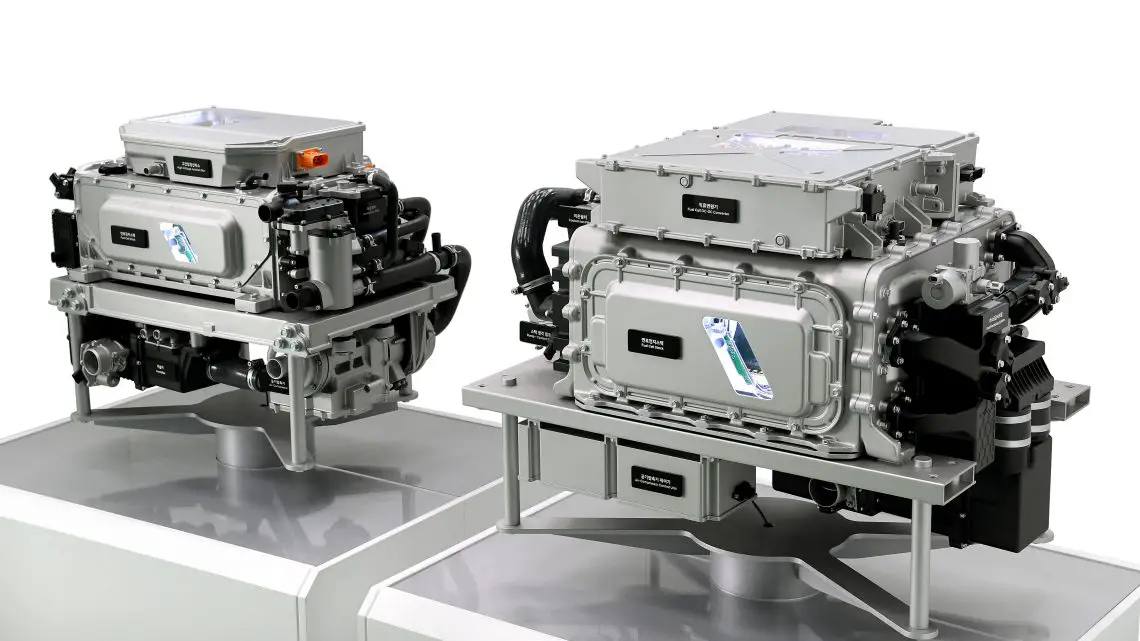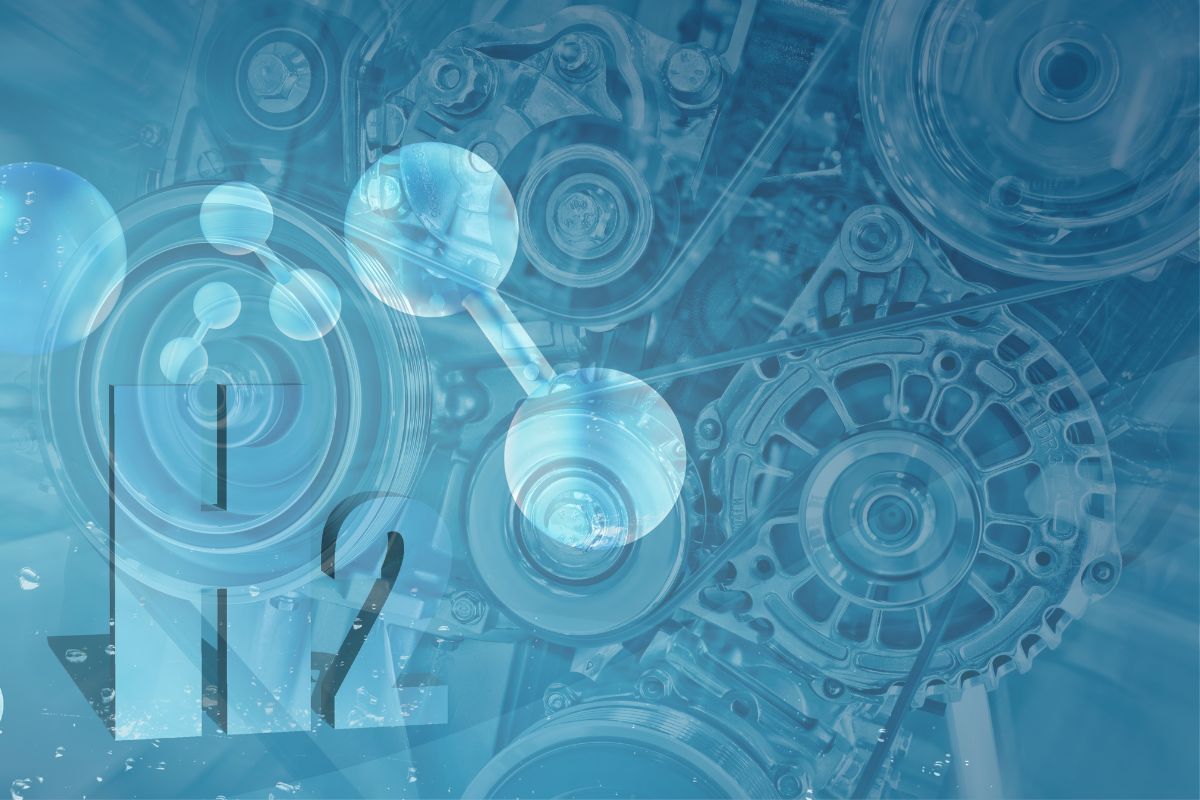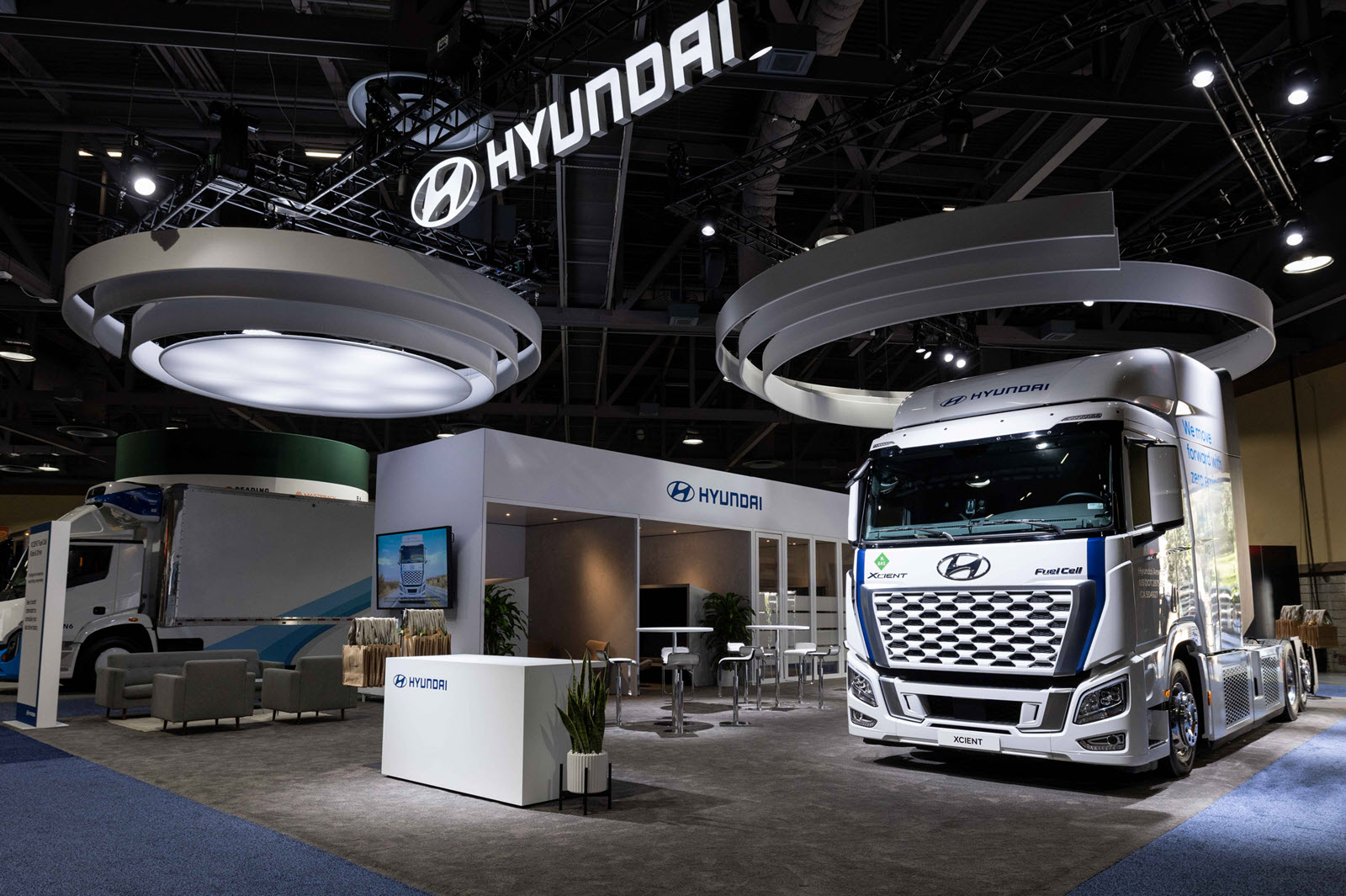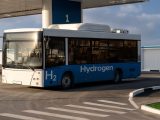
Hydrogen engines to be mass produced by Hyundai by 2025
March 7, 2023Hyundai Doosan Infracore (HDI) is speeding up its engine development and plans to mass-produce hydrogen engines by 2025. HDI’s new hydrogen-powered internal combustion engine can produce an output of 300 kW and satisfy the emission requirements necessary to achieve zero CO2 and zero impact emissions. The engines will be installed in mid-to-large commercial vehicles such as trucks, buses, and construction equipment.
Hyundai Doosan Infracore is accelerating engine development.
After the completion of its H2 internal combustion engines (ICE) design and rolling out the prototype, Hyundai Doosan Infracore (HDI) is revving up the development of its hydrogen engines, with the aim to mass produce these engines by 2025.
HDI’s H2 ICE is an 11-litre class engine.
 The hydrogen-powered internal combustion engine can produce a power output of 300 kW (402 HP) and a torque of 1700 NM at 2000 RPM. Fulfilling Tier 5/Stage 5/Euro7 regulation, the engine satisfies the emission requirements to be 90% decreased to the current level to meet Zero CO2 (below 1g/kwh) and Zero Impact Emission.
The hydrogen-powered internal combustion engine can produce a power output of 300 kW (402 HP) and a torque of 1700 NM at 2000 RPM. Fulfilling Tier 5/Stage 5/Euro7 regulation, the engine satisfies the emission requirements to be 90% decreased to the current level to meet Zero CO2 (below 1g/kwh) and Zero Impact Emission.
Low-purity hydrogen is used to power the hydrogen engines. This makes the engines not only strong, energy-dense and economical, but the most suitable engine system for mid-to-large-size vehicles and vehicles traveling long distances. Just one charge of 10 minutes allows for a distance up to 500 km (310.6 miles), meanwhile the H2 internal combustion engines are 25-30% more economical than battery packs or fuel cells when vehicle price and maintenance costs are factored in.

The new hydrogen engines will be installed in commercial vehicles.
To both accelerate commercialization and lower costs, HDI plans to leverage its current engine technology and facilities. The new hydrogen engines that will be produced will be installed on commercial vehicles, including large buses, trucks and construction equipment. HDI will unveil its prototype hydrogen-powered ICE power unit this year (2023), with plans for full-scale testing slated for 2024, and full-scale mass production planned for the following year in 2025.
“Hydrogen internal combustion engines will be used in mid-to-large-sized commercial vehicles such as trucks, buses and construction equipment and mid-to-large-sized power generators,” said Kim Joong-soo, HDI’s Head of the Engine Department. “We will put in the utmost effort to realize carbon neutrality in response to the eco-friendly market by developing green hydrogen-related technologies in line with increasingly strict carbon emission regulations.

Beyond its hydrogen engines, Hyundai Doosan Infracore has been busy with a number of other products, a variety of which will be showcased at the ConExpo 2023 in March. These products include EV battery packs, H2ICE, and plug-in hybrid powertrains.
UPDATE: Here’s footage of the ConExpo 2023



 With over 15 years of reporting hydrogen news, we are your premier source for the latest updates and insights in hydrogen and renewable energy.
With over 15 years of reporting hydrogen news, we are your premier source for the latest updates and insights in hydrogen and renewable energy.
Hi ,if anyone can do i know Hyundai can
Agree withthat comment Hyundai are on to it.
Current rush to immature EV technology is ideologically driven, and the market is not going to support it on the scale automakers seem to be banking on. When EV’s deliver the same utility for the same value, if that’s ever possible, they may proliferate as far as the personal transportation segment goes. Hydrogen makes a lot of sense for tranport, heavy equipment, and other applications.
Hydrogen makes zero sense for passenger vehicles. It’s at least three times more expensive that a battery EV to run. Fossil fuel companies are pushing hydrogen because it’s the same distribution model as petrol and diesel. In a battery EV world they lose control.
Hydrogen can be created through solar in the garage of a homeowner during each day at only the cost of equipment. Transfer to car is quick. Lighter than “battery weight” that wipes out energy in uphill climbs. The balance of convenience, long term cost savings, more reliability: in the & and in uphill climbs; puts this ahead of all the others. The remaining considerations are: the longevity of the home convertor and the longevity & safety of the engine. Vehicles powered by pressurized hydrogen will need safety and protective measures when used by the public. If we can build all we have in a cel phone today… we can definitely do this. We are storing power by only seperating the 3 molecules in water. The byproduct is oxygen. How more basic can it get? Conversion in a garage can be done in the same space as a waterheater closet. I have followed this for many years. I am not highly skilled or educated in this field, but when competition comes into play, costs will drop drastically if safety on the road is met.
Like to know more about it. Hope we can get the enjin for good prices to replace old ones.
What H2 ICE requires is a new engine and configuration design to produce air-fuel mix of 68:1… reciprocant piston ICE design can’t do this, a new ICE engine called Radian Engine can do it and with that amount of air almost no NOx is produced, besides this is a high torque-low RPM- high efficient thermodynamic engine that is completely different to conventional ICE piston engines and that will resolved this problem once and for all.
I feel that Hydrogen for personal vehicles would be a great option and choice for people when making a purchase of a vehicle for transpertation.
I seriously feel that there is a serious problem ahead with battery powered Transpertation.
I feel in there will be a serious problem with the decision of getting rid of Batteries t h at are no longer able to be used and where do you and how do you get rid of them.
Will they take the short cut and Contract it out and say “Not my problem now” it will end up us the people that will end up paying for the after.
When you think of it that really socks.
IAM NOT A TREE HUGGER ,BUT BUT I UNDERSTAND WE HAVE TO STOP PASSING IT DOWN AND START STOPPING. Thank you for your time.
I’ll take that bet. No one is going to choose expensive, inconvenient and rare hydrogen over cheap, convenient and ubiquitous electrons.
Oddly the main proponents of HFC say they are waiting for hydrogen because there aren’t sufficient public EV chargers – yet most refueling will be at home or work), how do they think they will get on with an incomplete expensive project non-profitable HFC charging network?network?
It will work better in a C.E.M. engine configuration and will be 40%smaller with equal or more torque.
Hydrogen technology will be A Great support to human kind & up coming growth by Hydrogen Engine in most required to sustain growth : with the help of Hydrogen Engine in all the Industry where power is required & by reducing CO2 emissions a great +ve cause replacement to petroleum.
Life will b easy, based on Hydrogen technology, even in farming, Industrial mega use, small to big use of nature in nature.
The new hydrogen engines are the only way forward for the cleanest environment future
Denis Waitly noted we would be driving around in vehicles exhausting pure oxygen some 25 years ago.
Electric car will be the worst for the environmental as they can’t be deposed of and will be a disaster as is the case in some countries.
Hydrogen is the one and only way forward for a clean future,
HHO, hydrogen on demand, my car runs a fuel enhancement system where the HHO is only produced when the engine is running, this cleans my emissions to almost zero & the engine runs more efficiently.
Why is this not more wide spread & in use now? And why is it not running all engines solely on HHO as has been done in the past? It seems all these systems are blocked.
A program back in the 90’s called Equinox showed a program, “It runs on water” (can be found on YouTube) & showed Stanley Mayer running his buggy only on water. HHO on demand is the way to go.
97 per cent of Hydrogen comes from fossil fuels..google it…If green Hydrogen is used it cant be more efficient than battery as electricity has to be used to make it ….Its all green wash…